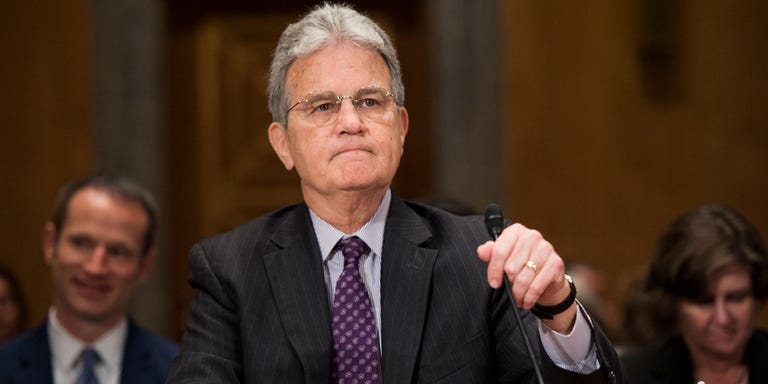Esquire
A Rising Constitutional Crisis No One Is Talking About
This week in the laboratories of democracy.
 Getty
Getty
By Charles P. Pierce October 12, 2017
(Permanent Musical Accompaniment To This Post)
We are going to do something unusual this week. Instead of skipping around the country in search of a state legislator with a duck on his head, or a state law making the date of Pat Robertson’s first orgasm a statewide holiday, we’re going to stay in this one spot and take stock of a truly dangerous bit of business that’s happening in a number of different states, and of a really long game that at the moment is perilously close to completion.
Last Sunday, Joy Reid hosted a discussion between former Senator Tom Coburn, the Oklahoma Republican and Teresa Tomlinson, the mayor of Columbus, Georgia. (While in the Senate, you may recall, Coburn was reckoned to be relatively normal because he served with Jim Inhofe, who is a failed replicant prototype that howls at the moon.) At issue was the proposed constitutional convention that would be called under Article V of the Constitution, a longtime conservative dreamshot that at the moment is as close to fulfillment as it ever has been. Under Article V, which deals with amending the Constitution, a constitutional convention must be called if two-thirds of the state legislatures called for it. At the moment, 27 state legislatures have done so. That leaves the plan a mere seven states short of the 34 that would meet the Article V threshold. As it happens, there are seven state legislatures with Republican majorities out there that have yet to take up the question. You can see why I’m just a little nervous.
Related Story

Colbert’s Question About Trump’s “Unraveling”
The movement has its roots in the drive for a balanced-budget amendment to the Constitution, a.k.a. The Worst Idea In American Politics. In his first term, President Ronald Reagan broached the idea in a televised address, causing constitutional scholars to duck and cover under their desks. By now, this is hardly an extreme position in the Republican Party; John Kasich, everyone’s favorite moderate manqué, has been a fan for years. There was no way that TWIIAP ever was going to be approved by two-thirds of both houses of Congress and then by two-thirds of the states. So this was the route its devotees took.
Many of the sharpies pushing the idea reassure the public that a convention thus called would be limited to a specific agenda. (Some even propose that the convention would pass TWIIAP and then everyone would drink up and go home.) There is no way to guarantee that; there’s certainly nothing in Article V that would support that argument, and very little in the history of the last constitutional convention that would do so, either.
The idea of a convention of Article V was one that came up very late in the proceedings. George Mason, the influential delegate from Virginia, rose to argue that the amending power as written left too much of that power to the national government. So he proposed that the several states be allowed to call a convention themselves. Mason’s colleague, James Madison, who hated revisionist constitutional conventions because he then nearly was finished hijacking one, perked right up. He immediately sussed out the difficulties:
“Mr Madison remarked on the vagueness of the terms, “call a Convention for the purpose.” as sufficient reason for reconsidering the article. How was a Convention to be formed? by what rule decide? what the force of its acts?”
All good questions, none of them ever has been answered.
A convention so called could pass TWIIAP lickety-split. That, of course, would be terrible in and of itself. But then the convention really could get down to business. There’s no apparent constitutional bar to a convention’s passing amendments allowing, say, congressional term limits, or requiring congressional supermajorities to pass any tax cut, or making raising the national debt limit dependent on the approval of a certain number of state legislatures. All of these are actual proposals floating around the various campaigns to bring this beast to life. Basically, this is the final masterwork of the conservative long game. These ideas have been around long enough to have become Republican dogma.
The party enlisted national sugar daddies like the Kochs, and regional ones like Art Pope in North Carolina. The radio and TV auxiliaries are led by Mark Levin, who wrote a whole book about the changes he wanted made, all of which would return the country to half-past the Articles of Confederation. They’ve suppressed the vote and gamed the maps. They have spent decades fashioning the state legislatures they need and now is the moment to strike. Looked at it from a distance, and ignoring the fact that the policy proposals are unworkable where they are not actually insane, it really is quite a political act of artistic creation.

teresatomlinson.com
(Here in the Commonwealth, God save it, the conservatives pushing the notion of a convention have “reached out” to their left by suggesting that some alterations in the Second Amendment might be possible. Yes, and the Sacred Cod is going to drop down into the well of the Massachusetts House and dance The Hustle.)
Last weekend, chased up a tree by Mayor Tomlinson, Coburn gave the whole game away. He began by saying that he was calling for “an amendments convention as long as you specifically state what areas you want to talk about.” This is, of course, nonsense. Here’s Article V in its entirety:
The Congress, whenever two thirds of both houses shall deem it necessary, shall propose amendments to this Constitution, or, on the application of the legislatures of two thirds of the several states, shall call a convention for proposing amendments, which, in either case, shall be valid to all intents and purposes, as part of this Constitution, when ratified by the legislatures of three fourths of the several states, or by conventions in three fourths thereof, as the one or the other mode of ratification may be proposed by the Congress; provided that no amendment which may be made prior to the year one thousand eight hundred and eight shall in any manner affect the first and fourth clauses in the ninth section of the first article; and that no state, without its consent, shall be deprived of its equal suffrage in the Senate.
You see anything in there that would require that a convention “specifically state what areas you want to talk about?” Neither do I. Coburn went on, though, blustering and fuming at the two women who kept pressing him for what he’s really up to here:
“We have three areas. We think there ought to be fiscal responsibility on the federal government’s part….We believe there ought to be term limits on our elected officials. (Ed. Note: Bingo!) The advantage of incumbency is unbelievable…And finally, we believe the scope and jurisdiction of the federal government ought to be what the Founders intended, which is a limited role, but very specific and very powerful, and what is not specifically set out for the federal government, left to the states.”
In other words, Coburn wants to enshrine in the Constitution itself every Republican national platform for the past 40 years. You will note that two of the three “areas” are pretty damn vague. How many amendments to the Constitution do you think it would take to roll back the federal government to a size that would satisfy Tom Coburn? Twelve? Twenty-seven? Eleventy-infinity? The mind boggles.
(Watch him as Mayor Tomlinson tells us about all the hidden jokers in this deck. Coburn looks like he’s going to float out of the studio in a burst of pure rage.)
But we’re talking about this today because all those state legislators with ducks on their heads who pass the laws making Pat Robertson’s first orgasm a statewide holiday, the people whom we’ve been mocking out the windows of the shebeen’s luxurious tour bus every Thursday for going on seven years now, these are the people who will be the delegates to this convention. Maybe you want to trade George Mason for the guy with the duck on his head, or James Madison and Alexander Hamilton for Mark Levin and Tom Coburn, but I don’t.
And we conclude right where we began, and as is our custom, in the great state of Oklahoma, where Blog Official Boot Scooter Friedman of the Plains was represented in the Senate for many years by both Coburn and Jim Inhofe and therefore has had enough trouble so we’ll leave him be this week.
This is your democracy, America. Cherish it…while you still can.
